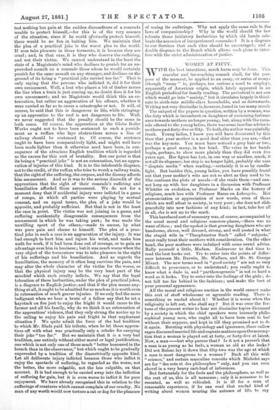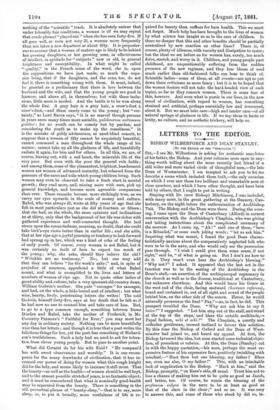WOMEN AT FIFTY.
WITH the best intentions, much harm may be done. This oracular and far-reaching remark shall, for the pur- pose of the moment, be applied to an essay, or series of essays (though " essay " is, perhaps, too serious a word to employ), apparently of American origin, which lately appeared in an English periodical for family reading. The periodical is not one which would go into " society," but it circulates largely in third- rate to sixth-rate middle-class households, and so downwards. Writing not very dissimilar is, however, found in too many novels
The subject of the papers in question, written by a woman, was the duty which is incumbent on daughters of exercising forbear- ance towards mothers no longer young; but, along with the coun- sels offered to the young ladies, there was some familiar advice to mothers past forty-five or fifty. To both, the author was painfully frank. Young ladies, I know you will have discovered by this time that your mother is a good deal older than you are,—that was the key-note. You must have noticed a grey hair or two, perhaps a good many, in her head. The veins in her hands begin, perhaps, to show more plainly than they did even five years ago. Her figure has lost, in one way or another, much, if not all its elegance; her step is no longer light, probably she uses " dioptric media " when reading,—certainly it is so by candle- light. But besides this, young ladies, you have possibly found out that your mother's wits are not so alert as they used to be. She confuses the plots of novels—if she reads them—and can- not keep up with her daughters in a discussion with Professor Whittler on evolution, or Professor Meeks on the history of religions, much less with Professor Basso on Lohengrin. Her pronunciation or appreciation of new words, even of those which are well afloat in society, is very poor ; she does not slide gracefully into new fashions of any kind ; in fact, take her all in all, she is not up to the mark.
This barefaced sort of summary was, of course, accompanied by the usual moral and religions common-places,—there was no want of them ; and the upshot is that growing daughters who are handsome, clever, well dressed, strong, and well posted in what the stupid wife in " Theophrastits Such" called "subjects," must really treat their mothers with consideration. On the other hand, the poor mothers were indulged with some sound advice. Rally yourself a little, Madam. Endeavour to find time to read the best books out. Try to enter into the points of differ- ence between Mr. Darwin, Mr. Wallace, and Mr. St. George Mivart. The new terms used in " good society " are not so very difficult to pronounce, or to understand; yop really ought to know what a dado is, and " parthenogenesis " is not so hard a word as it looks. Try to enter into the feelings of the girls ; do not fall too far behind in the fashions ; and make the best of your personal appearance.
All the moral and religious unction in the world cannot make this sort of stuff wholesome or agreeable reading. There is something so unclad about it ! Whether it is worse when the religiosity is left out, who shall say ? But it was once the for- tune of the present writer to hear not dissimilar topics discussed by a society in which the chief speakers were intensely philo- sophical young men, who ought all to have been sent to bed without their suppers, and kept in till they promised not to do it again. Bursting with physiology and ignorance, these callow sages discussed married life and cognate matters upon the assump- tion that a woman is played out at forty, or forty-five at latest. Now, a man—but why pursue that? Is it not a proverb that a man is as young as he feels, a woman as old as she looks ? Did not Balzac lay it down that fifty-two was the age at which a man is most dangerous to a woman ? Back all this with " science," and certain masculine conceits which Michelet says are for " des sots et des philosophes " only, and you can soon shovel in a very heavy cart-load of inferences.
But fortunately for the fools and the philosophers, as well as the rest of us, this is all nonsense ; only it is nonsense to be resented, as well as ridiculed. It is ill for a man of reasonable experience, if he can read that unclad kind of writing about women nearing the autumn of life, to say
nothing of the "scientific " trash. It is absolutely untrue that under tolerably fair conditions, a woman is (if we may repeat that crude phrase) " played out " when she has seen forty-five. If all goes well, or even not very ill, a woman more frequently than not takes a new departure at about fifty. It is preposter- ous to assume that a woman of mature age is likely to be behind her growing daughters, or her growing sons, in effectiveness of intellect, in aptitude for " subjects " new or old, in general brightness and susceptibility. In what might be called "quality," in the French sense of the word, she is, upon the suppositions we have just made, so much the supe- rior being, that if the daughters, and the sons, too, do not feel it, there is something wrong with them. It must, indeed, be granted as a preliminary that there is love between the husband and the wife, and that the young people are good in harness, and above all, in themselves ; but with these inclu- sions, little more is needed. And the battle is to be won along the whole line. A grey hair is a grey hair, a crow's-foot a crow's-foot,—and these rarely come to the young ; but "cer- tainly," as Lord Bacon says, " it is no marvel though persons in years seem many times more amiable, pukhrorum antummus pulder ; for no youth can be comely but by pardon, and considering the youth as to make up the comeliness." It is the mistake of giddy adolescence, or sand-blind conceit, to suppose that a woman of fifty cannot be exquisitely beautiful, cannot command a man throughout the whole range of his nature ; cannot take up all the gladness of life, and beautifully radiate it again, for him and for others. In all this, we are, of course, leaving out, with a sad heart, the miserable life of the very poor. But even with the poor the general rule holds ; and among them, some of the pleasantest, brightest, handsomest women are women of advanced maturity, but released from the pressure of the cares and toils which young children bring. Such women may even be observed to take a fresh start in mental growth ; they read more, and, mixing more with men, pick up general knowledge, and become more agreeable companions than ever. These remarks become more strikingly true, as we carry our eyes upwards in the scale of money and culture. Rahel, who was always ill, wrote at fifty years of age that she felt in most particulars just as she did at fourteen or fifteen ; that she had, on the whole, the same opinions and inclinations as at thirty, only that the background of her life was richer with gathered experience and well-connected thought. She laid stress upon the connectedness, meaning, no doubt, that she could take bird's-eye views better than in earlier life ; and she adds, that at her ripe age a joyful yearning or tendency to look forward had sprung up in her, which was a kind of echo of the feeling of early youth. Of course, every woman is not Rahel, but it was certainly no fault of hers to expect too much of the young ; why, she asks, should they believe the old P " Wrinkles are no testimony." No; but one may add that they can believe "for the work's sake ;" and, in spite of prejudice of nearness, apprehend a little of what Rahel meant, and what is exemplified in the lives and letters of numbers of women of ripe age. Not to quote other ladies of great ability and culture, take a very ignorant old country dame, William Godwin's mother. She puts " snccages " for sausages, and had, on the whole, a hide-bound sort of intellect ; but what wise, hearty, lively, penetrating letters she writes ! The cold Godwin, himself forty-five, says at her death that he felt as if he had now no one to counsel him and take care of him. But, to go to a type common enough, something between Dame Burden and Rahel, take the mother of Frederick, in Mr. Coventry Patmore's " Faithful for Ever;" you may meet her any day in ordinary society. Nothing can be more beautifully wise than her letters ; and though it is true that a poet writes the felicitous things for her, yet the poet has something of Richard- son's truthfulness. Such a lady had no need to ask for tolera- tion from clever young people. But to pass to another point.
What did Geraint do for his wife Enid ? "He compass'd her with sweet observances and worship." It is one recom- pense for the many drawbacks of civilisation. that it has in- creased our power of doing for women what this rough knight did for the lady, and seems likely to increase it still more. That the beauty—as well as the health—of women should be well kept, and to the utmost possible stretch of years, is no fantastic object; and it must be remembered that what is nominally good-health may be separated from the beauty. There is something in the old, proverbial phrase of " beauty-sleep,"—that is to say, more sleep, or, to put it broadly, more restfulness of life is re-
quired for beauty than suffices for bare health. This we must not forget. Much help has been brought to the lives of women by what science has taught us as to the care of children. Is there no danger that this and other benefits should be partially neutralised by new exaction on other lines P There is, of course, plenty of idleness, with vacuity and dissipation to spare ; but the ideal we set before us for women has, surely, too much drive, stretch, and worry in it. Children, and young people past childhood, are unquestionably suffering from the sudden pressure of the new regimen, and they lose bloom of soul much earlier than old-fashioned folks can bear to think of. Scientific ladies—some of them, at all events—are apt to put down these criticisms as mere fancy ; but it is to be hoped that the women doctors will not take the hard-headed view of such topics, so far as they concern women. There is some fear of this, however. And even what is poetic in our lives, in the new mood of civilisation, with regard to women, has something strained and artificial, perhaps essentially low and irreverent, about it. But we must take care—high and tender care—of all natural springs of gladness in life. If we tap these in baste or levity, no culture, and no msthetic trickery, will help us.































 Previous page
Previous page